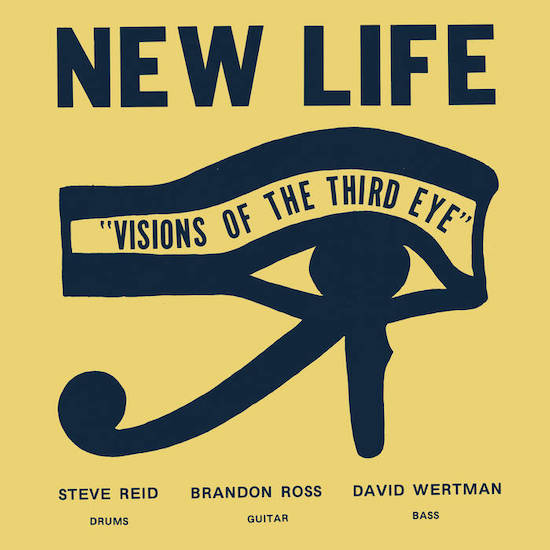Steve Reid’s performances as a drummer are among the greatest in 70s jazz. Part chaos, part metronome, his collaborations are the stuff of envy; long-term member of the Arkestra, an early drumming collaborator of Fela, and the lynchpin on a couple of later Miles Davis records. But it is his work as a bandleader that earns him a carving on percussion’s Mt. Rushmore.
The New York City sticksman’s records as a bandleader, Rhythmatism and Nova (both released after a stint in prison for draft dodging) have been the beneficiaries of comprehensive reissues on both Soul Jazz and Reid’s own reprised Mustevic Sound label over the last couple of years, for all to see the brilliance of those recordings. Rhythmatism skews funk into squalling jazzy palisades, whilst Nova adds dubby basslines to Reid’s frenzied playing, and luscious interplay between Joe Rigby’s sax, Ahmed Abdullah’s trumpet and Les Walker’s organ. In Rhythmatism and Nova we have two of the 70s’ highest watermarks. But that isn’t the end of the story for Steve Reid and his terminally underrated discography.
There is one record issued in the 70s on Mustevic that hasn’t seen the light of day since it was recorded. In the pantheon of jazz records, it has the feeling of ultimate Sangraal. From its stark name and its instantly iconic and quintessential afrofuturist cover, right down to the fact that the only copy on Discogs will set you back $899 and the only rip on YouTube is uploaded in the wrong order, Visions of the Third Eye by Steve Reid’s New Life trio could well be the holy grail of spiritual jazz records.
Indeed, I had a print of this album artwork on my uni bedroom wall long before I’d heard the album. Its striking visuals are also on the cover to the stellar 2009 Gilles Peterson book Freedom, Rhythm and Sound: Revolutionary Jazz Cover Art 1965-83, which I copped a poster of for a pound in Sounds of the Universe on account of it looking amazing. Peterson obviously deemed Visions of the Third Eye to have the most striking artwork in a genre of striking artworks, which is already a pretty strong case for the album as a lost treasure. Now, it is finally getting a reissue on Atlanta label Early Future records.
On this album, Steve Reid is at the heart of a three-piece, with double bassist David Wertman and guitarist Brandon Ross. The music contained on the disc is totally unique, a visceral and physical listen as all the players dance around each other with Matisse-esque vibrance. It is music always in motion, and Reid is the propulsive godhead that drives this music towards spiritual ecstasy. Since its recording in Tin Pan Hollow Studios, Vermont, in December 1978, the freeflowing compositions contained only sound more and more contemporary.
But this record is turned from a good one to an epochal one with the avant-guitar playing of Brandon Ross. The bastard riffs and freewheeling fingerpicking of the New Jersey guitarist are liminal and hypnagogic. On the Wertman-written ‘Egypt Rock’, he begins with a monolithic riff, before proceeding to a freewheeling fingerpicking frenzy that glides with great agility around Reid’s tubthumping bombast, whilst a cameo from violinist Terry Jenoure fills the soundscape with a haunting hymenoptera buzz. Ross’ playing is totally free of structural rigidity, but I think the most notable aspect of it is its intimacy. A lot of the tones are muted, a lot it quiet, but each pluck is a pontilist dab of the paintbrush on a painting you can’t help but marvel at.
Ross’s meditative and meandering lines adorning closer ‘Love Cipher’ are spectral, whilst his singing on opener ‘Empty Streets’ has the same phantom quality. It’s Ross’s playing that perhaps makes it so easy to draw comparisons not only to the Lounge Lizards (whom he has collaborated with in the past) but to the rest of what was happening in New York’s no-wave scene. Visions of the Third Eye might be a jazz record by genre, but elements of angular and jaunty experimental rock rear their head every now and then.
Wertman’s double bass is perhaps the anchor. Ross’s guitar runs free throughout, and Reid’s drumming often abandons rhythms and polyrhythms in favour of waltzing with Ross’s guitar. Responsible for half the compositions, Wertman’s contribution is invaluable – even if it’s not the thing that jumps out at you when the needles drop. Wertman’s work as bandleader also, is a crucial part of the Mustevic back catalogue for any archivists out there, and very little of that has been reissued since his passing.
By the time of Steve Reid’s death in 2010, people were already beginning to reappraise his work. After a couple of decades of relative quiet, he collaborated with Kieran Hebden on four albums in the late 00s, whilst most of his Mustevic albums were reissued with a renewed interest at that time. It feels very strange then, that Visions of the Third Eye is only now getting a proper reissue. It’s the kind of record that deserves a devout cult following, to be heard by the new generation of heads, and hopefully this Early Future release is the kick it needs for its stature to deservedly grow and grow.


